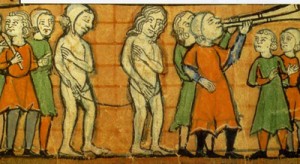By Prof Gwen Seabourne, Professor of Legal History (University of Bristol Law School)
 In a manslaughter case held in Swansea in 1968,[i] an unusual order was made. Thesiger J. decided that it should be heard by an all-female jury. He made the order under a discretion granted to him by the Sex Disqualification (Removal) Act 1919, the first, and apparently the only time that such an order was made in Wales or England.
In a manslaughter case held in Swansea in 1968,[i] an unusual order was made. Thesiger J. decided that it should be heard by an all-female jury. He made the order under a discretion granted to him by the Sex Disqualification (Removal) Act 1919, the first, and apparently the only time that such an order was made in Wales or England.
The possibility of ordering a single sex jury has long since been removed, but R. v. Sutton was and is important as an event, and as a working-out of the implications of the early, limited, moves towards women’s participation in public life which came with the Representation of the People Act 1918 and Sex Disqualification (Removal) Act 1919. The fiftieth anniversary of the case (and the approaching centenary of the 1919 Act) seems an appropriate moment to sketch some of its claims on our attention. (more…)

